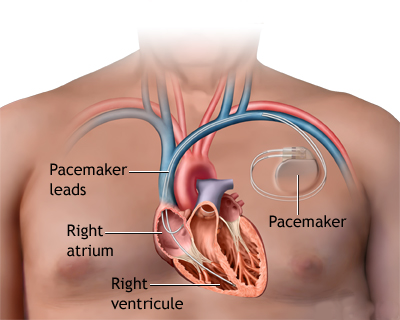A cardiac pacemaker so as not to be confused with the natural pacemaker of the heart), is a medical device that generates electrical impulses delivered by electrodes to cause the heart muscle chambers (the upper, or atria and/or the lower, or ventricles) to contract and therefore pump blood; by doing so this device replaces and/or regulates the function of the electrical conduction system of the heart. The primary purpose of a pacemaker is to maintain an adequate heart rate, either because the heart’s natural pacemaker is not fast enough, or because there is a block in the heart’s electrical conduction system.
PaceMaker
PaceMaker

Modern pacemakers are externally programmable and allow a cardiologist, particularly a cardiac electrophysiologist to select the optimal pacing modes for individual patients.
BENEFITS of PaceMaker:
By regulating the heart’s rhythm, a pacemaker can often eliminate the symptoms of bradycardia. This means individuals often have more energy and less shortness of breath. However, a pacemaker is not a cure. It will not prevent or stop heart disease, nor will it prevent heart attacks.
